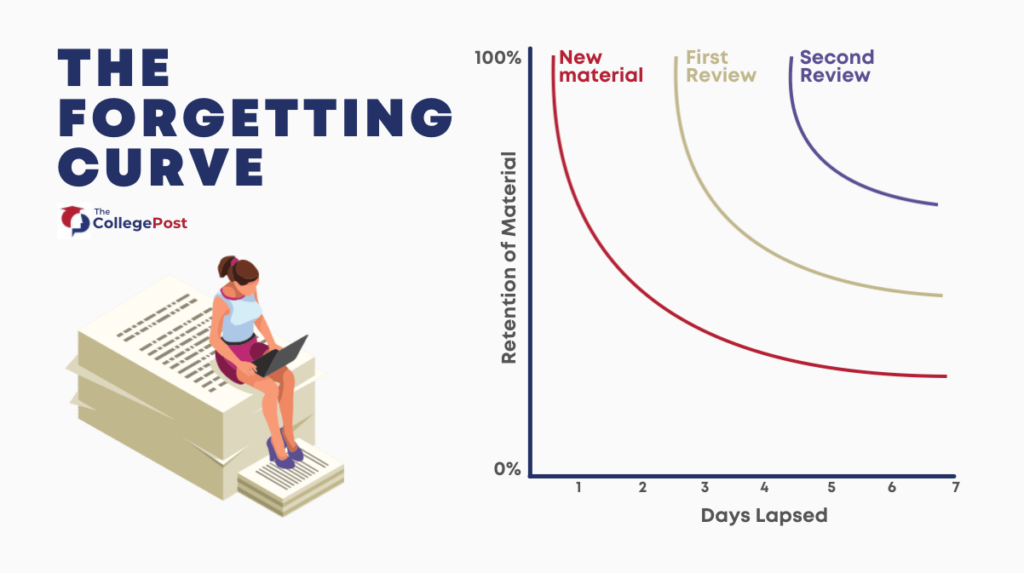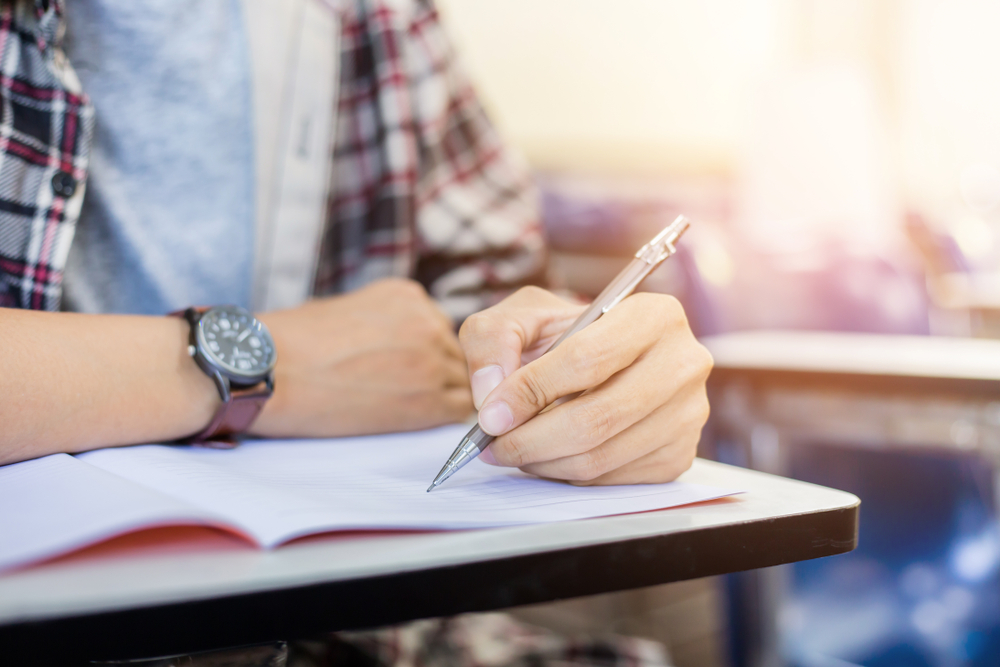Do you feel like your study habits aren’t cutting it? If long hours at the library are barely earning you a B-, maybe it’s time to reevaluate your study methods. Believe it or not, it’s not the hours that count but the study methods you use that can help you get that A.
To ensure maximum retention (and top grades), experts recommend sticking to scientifically proven study methods. That’s why we’ve rounded up 11 of these valuable strategies to help you study smarter, not harder! 
1. Challenge the ‘Forgetting Curve’: Review and Revise at Regular Intervals
You’ve recently binged a mind-boggling documentary series on Netflix. The ideas are thrilling, but would you remember the tiny details after a week or a month? We’re guessing not!
The forgetting curve — discovered by psychologist Hermann Ebbinghaus — demonstrates the rate at which we forget information over time. Readers should review materials within 24 hours of first seeing them and review them regularly to retain maximum information. Educational psychologists recommend this type of spaced learning as opposed to “cramming” right before a test.


2. Use Mind Maps: Represent Critical Information Visually
Using diagrams to represent information goes back to the Italian Renaissance when Leonardo Da Vinci created mind maps to take notes.
While using the mind map technique might have been more painstaking during Leonardo’s time, today, there are many online tools for this purpose. Easy and fun to create, mind maps are a great alternative to your traditional note-taking sessions.
A mind map is a study method involving a radial diagram that starts with the main idea at the center and grows outward with other information linked to the central concept. With the help of mental triggers such as colors, pictures, or connections, mind maps help our brains more easily store important information.

3. Change Your Scenery: Move to a Different Room or Even Outside
Tired of long hours of online classes? Maybe you can’t control your school routine, but you can always control how and where you do your work. Why not attend your Zoom calls at a coffee shop, bookstore, your friend’s apartment, or even your favorite outdoor spot.

A cup of joe and some vitamin D will help you get the ball rolling in no time. Studies also show that a change of scenery can work wonders for your mood and concentration. So grab your laptop, ditch your dorm, and find a cozy study space to finish your essay. Don’t forget to check for free WiFi!

4. Try the Pomodoro Technique: Short, Timed Sessions to Boost Productivity
The Pomodoro Technique is a time management and study method that involves dividing your work into 25-minute intervals, each separated by a five-minute break. It’s no surprise that the technique was developed by a university student named Francesco Cirillo, who struggled to complete his assignments.
Cirillo used his tomato (called “pomodoro” in Italian) shaped timer and decided to pay undivided attention for 10 minutes, followed by a break. Encouraged by his success, he repeated the process and later named the technique after his timer!
The goal of this technique is to keep yourself motivated and cut down on distractions. Try not to grab your phone during your break because social media can easily divert your attention, and be careful not to extend your break past the recommended five minutes.

5. Listen to Music: Improve Mood, Motivation, and Memory
You might have heard about the Mozart Effect — the theory that listening to Mozart improves focus. Music can help students perform better in high-pressure situations, which is why people often turn on their favorite tunes while studying for their exams, solving math problems, or even working on PowerPoint presentations.
It also helps that music, especially classical music, is an excellent stress-buster. So without further ado, make a playlist of your favorite songs and get working on your assignments. Make sure the music is not too fast or too loud, in which case it could have the opposite effect than intended.

6. Take Tests: Practice Makes Perfect
Test anxiety is a real challenge for many students. To avoid being a bundle of nerves on exam day, it’s a good idea to do practice sessions beforehand. Practice tests put you in a similar environment to the exam, which can help you prepare yourself to be in the right headspace for the real test.

Plus, the more practice tests you have under your belt, the easier it is to identify gaps in your knowledge. You can also use online study tools to track your progress and focus on the areas where you have underperformed.

7. Try the Feynman Technique: Playing Teacher Goes a Long Way
Nobel Prize-winning physicist Richard Feynman believed reading a book is not the same as completely understanding the book. To grasp the whole meaning of a text, he proposed the learning technique that would bear his name.
The Feynman Technique suggests choosing a small topic or concept and teaching it to yourself or someone else. If you get stuck somewhere, go back to your notes to fill in the gaps in your knowledge. Teaching helps you engage deeply with the study material and identify holes in your understanding of the concept.

8. Quit Multitasking: Do the Right Thing at the Right Time
Sometimes you just have to accept that you’re no Clark Kent or Peter Parker — so multitasking is not your forte. Quit juggling social media or other distractions while listening to an online course or writing an assignment. Instead, pay attention to your work so that you don’t actually end up studying for longer than you need.
If you think 10 minutes of social media won’t damage your one hour of study time, think again! Chances are you will be dreaming about your newsfeed (and all the people on it) long after you have resumed working. Instead of forming damaging study habits, divide your schedule so that you can achieve a balance between your work and free time.

9. Form Study Groups: Share Ideas and Collaborate to Finish Tasks
Learning together is a great way to gain different perspectives on a subject. As you discuss it and listen to others, concepts that were once unclear will become easier to understand. Plus, you’ll come across a wide range of viewpoints that could enhance your critical thinking skills.

Studying alone can mean grabbing your phone at intervals or taking snack breaks that go up to an hour. Focused study group sessions help fight these distractions. You’re forced to stay at the top of your study game while competing and collaborating with other members of your group.

10. Make Flashcards: Retain Important Information in Small Pieces
Flashcards are incredibly useful before an exam when you have a lot of material to review but lack time to go through every detail. As memory-aid tools, flashcards help to summarize the key points of a lesson.
Since they’re portable, you can easily carry flashcards in your bag or even your jeans’ pocket. Don’t forget to pepper your texts with images. Experts say that the human mind captures and retains images better than it remembers the corresponding words.

11. Say No to All-Nighters: A Sleepy Mind Hampers Productivity
Although many swear by pulling all-night study sessions before an exam, experts say this is a bad habit because this type of revision only activates a person’s short-term memory. Studying throughout the year leads to better retention when compared to trying to assimilate large chunks of information within a limited time.
Sleep deprivation also results in decreased alertness in a test or class, leading to poor academic outcomes. To overcome an endless cycle of delayed assignments, deprived sleep, and low grades, we can never overemphasize the importance of eight hours of shut-eye.

If there’s one thing in this world we’re short on, it’s time! 






